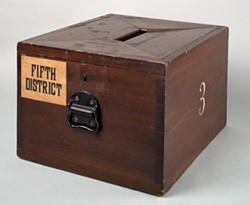 By Madison Alder | Cronkite News
By Madison Alder | Cronkite News
A federal appeals court Wednesday restored Tucson’s voting system – for now – so it can reconsider a challenge by a group of voters who claim the city’s unusual hybrid election system violates the one-person, one-vote principle.
A divided three-judge panel of the 9th U.S. Circuit Court of Appeals had ruled in November that Tucson’s system, which mixes ward-based primaries with at-large general elections, was unconstitutional. But the full appellate court agreed Wednesday to hear the city’s appeal of that decision.
“Since this is what we’ve asked for, we’re very pleased with the result,” said Tucson City Attorney Michael Rankin, who argued the case for the city. “This is very important case to us because it tried the constitutionality of our election system and our charter provisions.”
The attorney for the voters who challenged the system said he was not surprised that the full court agreed to take the case, since cases this “controversial and important” are often ordered reheard by a full court.
“We’ve followed the case because we thought it was meritorious,” said the attorney, Kory Langhofer. “We’re fairly confident going forward.”
The full court’s order that it would rehear the case was made without comment Wednesday. Both Langhofer and Rankin said arguments before the full court have been scheduled for June 20.
There, they will reargue the challenge by five voters and the Public Integrity Alliance, an Arizona nonprofit that describes itself as a government watchdog group, to Tucson’s hybrid voting system.
The decades-old system – twice reaffirmed by city voters – mandates that council members are first nominated in primaries that are based on city ward boundaries, limiting primary voters to just those people living in the ward. After that, the nominees run for office in a citywide, at-large general election.
Three council members are elected every other year in staggered cycles to four-year terms. In 2015, council members were elected to serve as representatives of wards 1, 2 and 3, while in 2017 there will be races for council seats in wards 4, 5 and 6.
According to the November ruling, Public Integrity Alliance conceded that there would be no problem if the city held primaries and general elections by ward, or if it held them both at-large. But mixing the two methods violated the one-person, one-vote principle, the group said, because it prevents half the city’s voters from participating in the primaries in a given election year.
A panel in November agreed with the Public Integrity Alliance. In his opinion for the majority, Judge Alex Kozinski wrote that Democrats could unfairly benefit from such a system because of the city’s Democratic bent.
“This means that the Democratic nominee from each ward will likely win the general election regardless of whether the ward from which he was nominated is principally Republican or Democratic,” Kozinski wrote.
But in his dissent, Judge Richard Tallman said that the court’s decision forces voters to choose either a ward-based or at-large election process “despite the fact that a majority of Tucson citizens have twice before voted against adopting these election systems.”
“There are certain times when a federal court may tell a municipality how to run its local elections,” Tallman wrote. “This is not one of them.”











